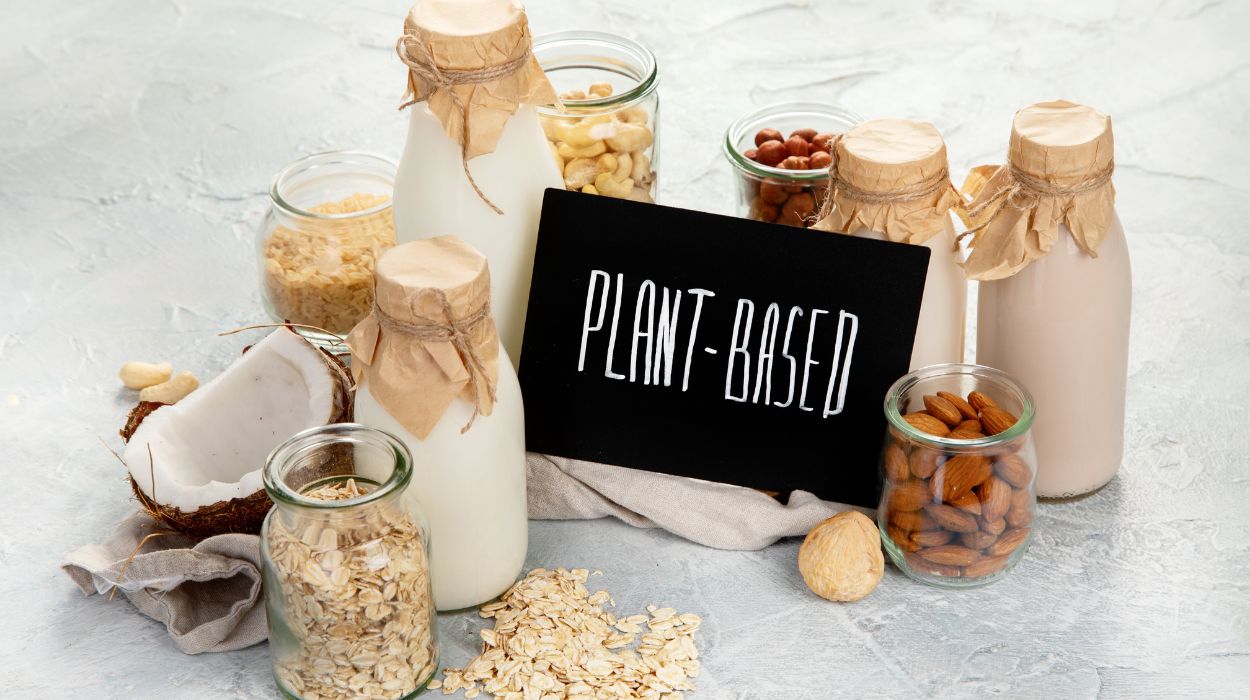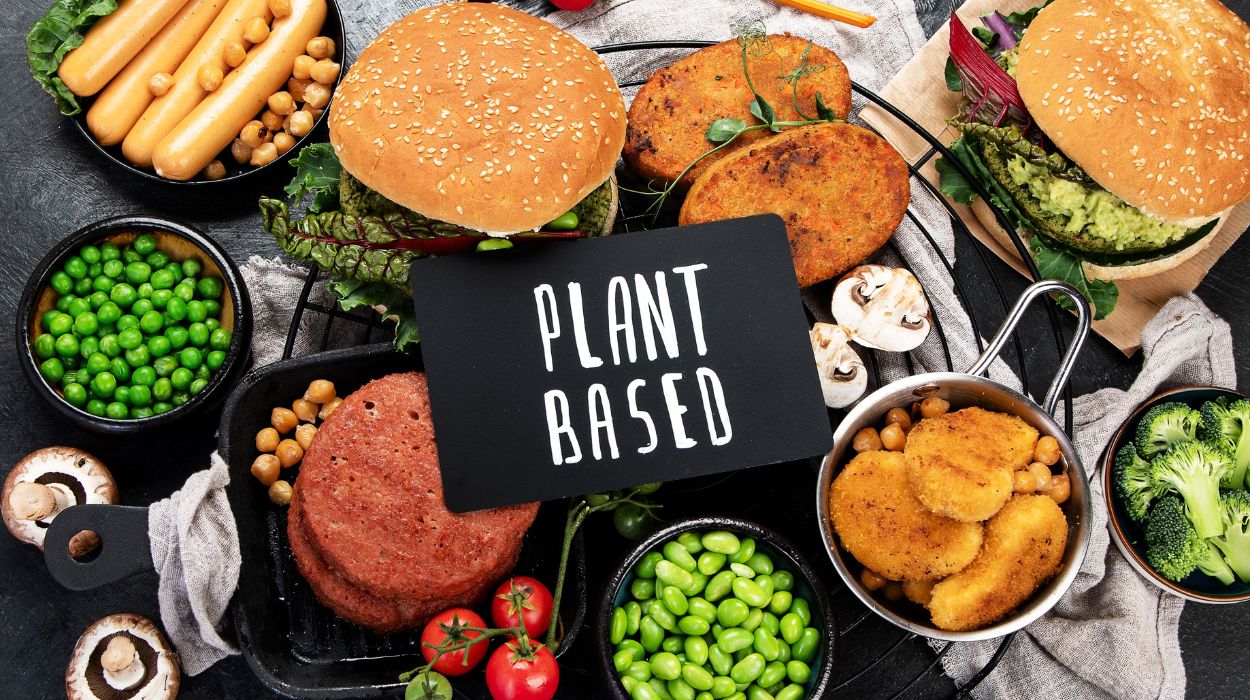 Expert's opinion
Expert's opinion
Expert's opinion
The article is a subjective view on this topic written by writers specializing in medical writing.
It may reflect on a personal journey surrounding struggles with an illness or medical condition, involve product comparisons, diet considerations, or other health-related opinions.
Although the view is entirely that of the writer, it is based on academic experiences and scientific research they have conducted; it is fact-checked by a team of degreed medical experts, and validated by sources attached to the article.
The numbers in parenthesis (1,2,3) will take you to clickable links to related scientific papers.
Plant-Based Diet For Beginners 2024 – The Ultimate Guide To Start

Should you choose a plant-based diet? A vegan lifestyle offers you riches far beyond your waistline. Here’s how you can harness the health benefits of veganism yourself.
What Is A Plant-Based Diet For Weight Loss?
According to data from the Adventist Health Study[1], the fewer animal-based products one’s diet contains, the lower one’s BMI tends to be on average. First of all, whole foods and plant-based foods contain no cholesterol natively[2], and second, a strict vegan diet certainly makes some of the most dangerous culinary options completely unacceptable. Thus, it’s a great way to police you away from the usual hazards that doom the most well-intentioned diet ambitions. These are only two factors to consider, though. There’s so much more to love about truly going green[3].
A vegan diet[4] is one that includes no animal or animal-derived ingredients[4] – even the honey in your cupboard should be considered non-vegan, contrary to popular belief.
What is it about plant-based nutrition that’s so good for you? Some attribute the credit to a reduction of certain types of protein, such as methionine, leucine, and histidine[5]. Others believe that the difference comes down to the composition of a plant-based meal compared to what an ordinary American diet consists of.
Calorie density, the water content of the food, and the source of the protein that fuels your day may all have something to do with these health benefits. The effect that plant-based eating appears to have on glucagon and insulin[6] may also stand out in relevance. These properties mean that your vegan diet can help prevent cancer, heart disease, and high cholesterol while also improving control of blood sugar, whether you have diabetes.
Honestly, we read none of the research before giving veganism a shot. We just jumped right in, and the results were self-explanatory. Trust us when we say that you’ll feel the difference.
Plant-Based Diet For Beginners
Plant Foods To Eat
So, you’ve finally taken the plunge. What exactly should your plant-based diet meal plan look like every day? Just like any diet, plant-based dietary patterns should include whole grains, healthy fats, adequate protein, and plenty of fiber.
Everybody’s arsenal is going to look different. If you’re just getting started, however, the following are all vegan staples that you’ll never catch us without
- Rice[7] (and quinoa, one of two complete and plant-based proteins)
- Flour, including rice flour, besan flour, and even cornstarch
- Pasta, of course
- Legumes, such as lentils, beans, and chickpeas
- Nuts and seeds, especially hemp seeds, flaxseeds, walnuts, and chia seeds[8]
- Nut kinds of butter
- Canned goods, such as canned tomatoes
- Dried fruits, like raisins and goji berries
- Spices of every type
- Healthy oils, such as coconut oil, olive oil, avocado oil, and sesame oil
- Your favorite vinegar (apple cider vinegar is one vegan must-have)
- Sweetening agents, like dates, coconut palm sugar, and monk fruit extract
This last category may prove to be vital if you love to bake sweets at home. There are many zero-calorie vegan sweeteners that you can choose from; replacing the sugar in your favorite recipes is one easy way to cut calories and eat healthy without missing out. Reducing your sodium intake is also a great idea[9]; you might even be able to knock your blood pressure down a few notches (bonus!).
As far as your fridge goes, we can recommend keeping these versatile vegan ingredients on hand at all times:
- A hearty supply of fruits and vegetables
- Tofu, the reigning champ in vegan protein on a dime
- Your favorite jam or jelly (bonus points if you made it yourself)
- Your favorite sauces and vegan condiments
- Vegan butter and other treats that need to be kept cool

As far as equipment goes, you’ll certainly want to invest in a decent blender—we love our Ninja, both for quick, healthy smoothies, as well as for making sauces, flour blends, pesto, and hummus. A Microplane, a julienne peeler, a steamer, and an immersion blender may also be wise moves to make. If you love to cook, devising your own homemade vegan meals at home will likely be the best part of making the transition.
Again, there are no “ideal” vegan foods for weight loss—you can literally eat anything under the sun, as long as you’re meeting your caloric goal each day. There are no rules for your whole-food, plant-based diet. Remember that losing weight is Calories In [minus] Energy expended [=] Pounds lost. I make this point to tell you that you can fail to lose weight–even gain weight–on ANY diet if your calories consumed outpace your calories burned.
A plant-based meal subscription service can help you get the ball rolling when you’re stuck for healthy plant-based recipes. If you love to exercise, you’re in for a delicious journey.
Food To Avoid

Just because being vegan is awesome doesn’t mean it’s all fun and games. A vegan diet is a methodology, and you may not be able to enforce it if you are with friends or socializing. The reassuring reality: over the last decade or so, tens of thousands of new vegan products have hit the market—fake cheese, processed vegan lunch meat, and even dairy-free ice cream.
While Follow Your Heart is, in fact, life, you should abstain from some of these tastier options if you’re going vegan to promote weight loss. Just like non-vegan junk, even plant-based ingredients may begin to add up quickly if you’re not careful. Wow. No cow? Are you sure?
- Fake meat (tofu is way better!)
- Sugary desserts, like chocolate, ice cream, and cakes
- “Power bars,” and even some “healthy” granola bars
- Meal replacements
- Vegan potato chips, and other bagged snacks
- Many frozen vegan selections (we’re looking at you, tofu nuggets)
- Any processed vegan food with tons of added sugar—vegan yogurt is one example, but there are tons of healthy alternatives that you can choose instead
While branded vegan junk food isn’t all that you need to worry about, things like nuts, avocados, and other densely caloric whole-food ingredients should also be on your radar. In our experience, it’s usually much easier to enjoy these in moderation. If you’re starving when you sit down to eat, though, you may accidentally fail this challenge; best to organize your day of meals so that you never reach that point.
How To Lose Weight Fast On A Plant-Based Diet?
Plant-based meals come in all shapes and sizes; it really doesn’t matter what you eat as long as you have the energy to live your life and you do what you can to avoid exceeding a daily calorie goal chosen with your lifestyle in mind.
You’ll need two things at the end of the day: a small kitchen scale and, ideally, a calorie-counting app like MyFitnessPal or Chronometer. If you document every meal and snack, you’ll know exactly where you stand at any given time. These tools will be especially useful if fitness is a large part of your weight loss plan—apps like these are like calculators that take your entire day into account, leaving no mysteries.
It’s really simple: do some research, choose a daily calorie goal, and commit to the program. After two weeks on an entirely plant-based diet, we guarantee that you’ll be feeling absolutely incredible.
There are tons of vegan diets that you can try, but if you’re eating vegan to lose weight, we really do recommend a purposeful and mindful shift in mindset above all else. When you’re able to heal your relationship with food, every meal becomes a joyful act of self-love.
Enough of the corniness, though. What’s the best way to approach a plant-based diet for weight loss? Honestly, this comes down to you and your preferences. Our best piece of advice is to explore and gain some understanding of what you like. Then, you’ll be able to stock your pantry and fridge with healthy essentials. Home cooking is 100 percent the way to go since you’re the only person you can trust completely with the ingredients.
Precautions
One size does not fit all, no matter which type of diet you’ve decided to use. For example, older adults may not get enough zinc, calcium, iron, or vitamin B12. Pregnant women may not get enough iron, vitamin B12, or–very importantly–folic acid. Children are another special population that should be monitored. The advice of a physician or dietitian/nutritionist should accompany any plant-based diet for these special populations.
The Bottom Line
Is going vegan the answer? Honestly, we promise that you won’t regret it, even if only as a two-week detox diet. You’ll look amazing, feel great, and feel so much less anxious at work[10].
Eating more plant-based foods is only the beginning. If dropping body weight is your ultimate goal, you will never make a better decision in your life than using plant-based foods to jump-start this process.
+ 10 sources
Health Canal avoids using tertiary references. We have strict sourcing guidelines and rely on peer-reviewed studies, academic researches from medical associations and institutions. To ensure the accuracy of articles in Health Canal, you can read more about the editorial process here
- Tonstad, S., Stewart, K., Oda, K., Batech, M., Herring, R.P. and Fraser, G.E. (2013). Vegetarian diets and incidence of diabetes in the Adventist Health Study-2. Nutrition, Metabolism and Cardiovascular Diseases, [online] 23(4), pp.292–299. Available at: https://pubmed.ncbi.nlm.nih.gov/21983060/.
- Antoniazzi, L. and Acosta-Navarro, J. (2017). The Paradox of Ingestion of Dietary Cholesterol in ‘Vegans’. Nutrients, [online] 9(7), p.745. Available at: https://www.ncbi.nlm.nih.gov/pmc/articles/PMC5537859/.
- Craig, W.J. (2009). Health effects of vegan diets. The American Journal of Clinical Nutrition, [online] 89(5), pp.1627S1633S. Available at: https://pubmed.ncbi.nlm.nih.gov/19279075/.
- Turner-McGrievy, G., Mandes, T. and Crimarco, A. (2017). A plant-based diet for overweight and obesity prevention and treatment. Journal of geriatric cardiology : JGC, [online] 14(5), pp.369–374. Available at: https://www.ncbi.nlm.nih.gov/pmc/articles/PMC5466943/.
- Kahleova, H., Fleeman, R., Hlozkova, A., Holubkov, R. and Barnard, N.D. (2018). A plant-based diet in overweight individuals in a 16-week randomized clinical trial: metabolic benefits of plant protein. Nutrition & Diabetes, [online] 8(1). Available at: https://www.ncbi.nlm.nih.gov/pmc/articles/PMC6221888/.
- Krajcovicova-Kudlackova M;Babinska K;Valachovicova M (2013). Health benefits and risks of plant proteins. Bratislavske lekarske listy, [online] 106(6-7). Available at: https://pubmed.ncbi.nlm.nih.gov/16201743/.
- Hertzler, S.R., Lieblein-Boff, J.C., Weiler, M. and Allgeier, C. (2020). Plant Proteins: Assessing Their Nutritional Quality and Effects on Health and Physical Function. Nutrients, [online] 12(12), p.3704. Available at: https://www.ncbi.nlm.nih.gov/pmc/articles/PMC7760812/.
- Burns-Whitmore, Froyen, Heskey, Parker and San Pablo (2019). Alpha-Linolenic and Linoleic Fatty Acids in the Vegan Diet: Do They Require Dietary Reference Intake/Adequate Intake Special Consideration? Nutrients, [online] 11(10), p.2365. Available at: https://www.ncbi.nlm.nih.gov/pmc/articles/PMC6835948/.
- Aburto, N.J., Ziolkovska, A., Hooper, L., Elliott, P., Cappuccio, F.P. and Meerpohl, J.J. (2013). Effect of lower sodium intake on health: systematic review and meta-analyses. BMJ, [online] 346(apr03 3), pp.f1326–f1326. Available at: https://pubmed.ncbi.nlm.nih.gov/23558163/.
- Beezhold, B., Radnitz, C., Rinne, A. and DiMatteo, J. (2014). Vegans report less stress and anxiety than omnivores. Nutritional Neuroscience, [online] 18(7), pp.289–296. Available at: https://pubmed.ncbi.nlm.nih.gov/25415255/.



